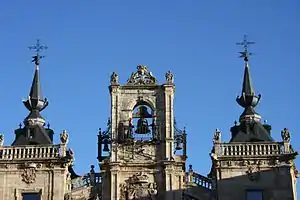Siege of Astorga (1812)
The siege of Astorga of 1812 took place between 29 June and 19 August 1812, at Astorga, León, Castile-León, Spain, during the Peninsular War.
| Siege of Astorga (1812) | |||||||
|---|---|---|---|---|---|---|---|
| Part of the Peninsular War | |||||||
 View of the Town Hall of Astorga | |||||||
| |||||||
| Belligerents | |||||||
|
|
| ||||||
| Commanders and leaders | |||||||
|
| |||||||
| Strength | |||||||
|
2,000 14–17 guns | 28,000 | ||||||
| Casualties and losses | |||||||
|
1,200 killed, wounded or captured 14–17 guns lost | Unknown | ||||||
Background
The French autumn counterattack started with the Siege of Astorga.
Siege
On 29 June, the Spanish troops of Lieutenant-General Francisco Gómez de Terán y Negrete, Marquess of Portago, started the operations, and laid siege to Astorga. The siege was part of the Allied offensive in the summer of 1812. The Spanish VI Army led by General José María Santocildes, by order of General Francisco Castaños, take the measures necessary for the recovery of Astorga. On 18 August, after a hard resistance, the French garrison surrendered to the Spaniards.[1] During the siege, part of the Spanish troops marched towards Salamanca to join the Allied army under Arthur Wellesley, commanded by General Santocildes, and contributed successfully in the campaign with the capture of Tordesillas, blocking Toro and Zamora, and occupying Valladolid.[1]
Aftermath
The French autumn counterattack proceeded with the Siege of Burgos.
See also
Notes
References
- wikisource (2011). "Capitulación de Astorga (1812)". Archived from the original on 20 May 2011.
Further reading
- Esdaile, Charles J. (1988). The Spanish Army in the Peninsular War. Manchester University Press. ISBN 0-7190-2538-9.
- Lovett, Gabriel H. (1965). Napoleon and the Birth of Modern Spain New York UP. London. ISBN 0-8147-0267-8.
{{cite book}}: CS1 maint: location missing publisher (link) - Wellesley, Arthur (2012). The dispatches of Field Marshal the Duke of Wellington, during his various campaigns from 1799 to 1818. London.
{{cite book}}: CS1 maint: location missing publisher (link)
External links
 Media related to Siege of Astorga (1812) at Wikimedia Commons
Media related to Siege of Astorga (1812) at Wikimedia Commons